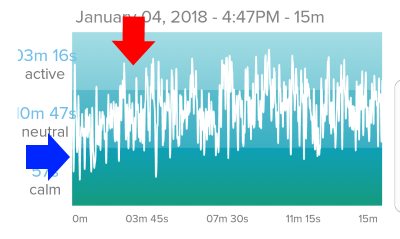Mindfulness Racing Thoughts
Mindfulness, Racing Thoughts, and Some Ways to Slow Down and Take Note
Posted on .When I sit down to meditate or do some type of mindfulness exercise I often find that once my mind is not occupied with some other task, it begins to race.
It's as though, once I stop occupying it with the million other things required in a day (driving, watching the kids, writing blog posts, managing a team, writing emails, meeting with clients, etc), the first thing it wants to do is tear into all those topics and unfinished to-do list items at light speed.
The end result is that I can feel less calm at the end than when I began. Yes, it is helpful in practicing recovery and improving awareness. And I understand that these are important skills and I am happy to practice them, understanding that this is not failure.
However, I'd like to be able to settle in more quickly and bring such mind racing a little bit more to heel. Or just get better at noticing and recovering faster. Which I think is an OK thing to want to do. Here is an example from the Muse app of what I am talking about:

In the beginning at the blue arrow, I actually start out fairly calm. Think, "I'm sitting down to focus - I'm relaxed and happy I'm making time to do this in my day because it's important." This is a nice feeling.
But fairly quickly, between the blue and red arrows, and during all of the session after the red arrow, my mind begins to race and I have a hard time feeling calm or staying calm for any length of time. You can see this in the upward trend of the line between the blue and red arrows. Also in the fact that the line does not trend down anywhere, but stays at the higher level through the duration of the exercise.
I'm currently using three techniques in order to manage this:
- Noting - by taking note of this tendency and also using basic 10-count breathing (in the Headspace-style) I simply try to remember that within each breath and between each breath I am staying focused on my breathing. Also, for one reason or another I have much more of a tendency to stay focused on the 1-2 and 9-10 breaths, and therefore I make special note on the 3-4, 5-6, and 7-8 breaths to stay focused on breathing, while allowing my bookend breaths (1-2, 9-10) to flow more naturally and without note. This means that even if the exercise doesn't particularly call for it, I need to try to incorporate the 10-count element.
- An Inner Appeal - Another technique (this one a more recent development) is that when I notice I seem to have a 'mind-racing' challenge on a particular day, I make an internal appeal. Something along the lines of, "Dear Brain, It's important to integrate the whole body and make room for emotions and other types of awareness. I'm really focused on breath in order to make space for this in my life so that I can be healthier. Can you please help me out with this by also focusing on the breath?"
- I'm using the coherence techniques from Dr. Alan Watkins' book Coherence. The goal of this is to get into a coherent biofeedback loop where you control your stress level by directly managing your breath in a fairly specific way. I'm not going to describe it exactly - you can buy the book or use their app: link to website that can get you to either iOS or Android. The app costs money ($7) and requires an external heart rate monitor, so it isn't exactly a cheap thing to use. You don't need the app, you can read the book and follow the instructions in the app - no app or heart rate monitor required.
When I actually write down number 2 like that it is a bit strange and implies some boundaries and distinctions between mind and self that I'm not sure I agree with or endorse. Nonetheless, it helps so I do it.
Number 3 has started to yield longer term results - i.e. I feel calmer from doing it. However, it hasn't helped much directly on the problem of racing thoughts that seem to happen during a session. But I've only been doing it for a few weeks and it is a skill that takes some getting used to. Also, I'm not sure that it is fair to judge the technique against something that it was never specifically prescribed to do. It just seems like it should work as the racing thoughts definitely cause the opposite - a negative loop where the racing thoughts causes stress that leads to more racing thoughts which leads to more stress.
I have no idea if any of these techniques are tried or supported by anyone besides me. I know of the idea of noting from reading something about it on the internet. Here is a link to article about it, though it is not the original one that I read: Noting. I included a link to Dr. Watkins' book above. If you are interested in mindfulness, mind-body connections, mindfulness and leadership, or stress management you should read that book.
